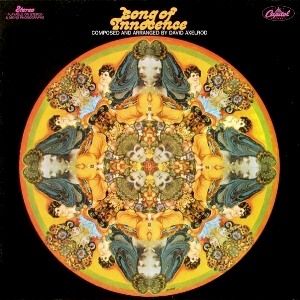This page is based on this
Wikipedia article Text is available under the
CC BY-SA 4.0 license; additional terms may apply.
Images, videos and audio are available under their respective licenses.
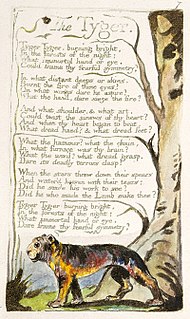
"The Tyger" is a poem by the English poet William Blake published in 1794 as part of the Songs of Experience collection. Literary critic Alfred Kazin calls it "the most famous of his poems", and The Cambridge Companion to William Blake says it is "the most anthologized poem in English". It is one of Blake's most reinterpreted and arranged works.
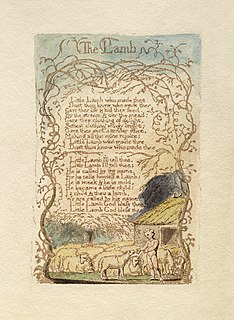
"The Lamb" is a poem by William Blake, published in Songs of Innocence in 1789.
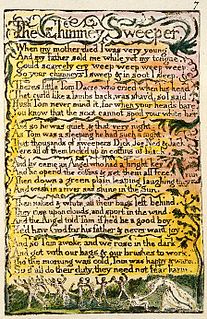
"The Chimney Sweeper" is the title of a poem by William Blake, published in two parts in Songs of Innocence in 1789 and Songs of experience in 1793. The poem "The Chimney Sweeper" is set against the dark background of child labour that was prominent in England in the late 18th and 19th century. At the age of four and five, boys were sold to clean chimneys, due to their small size. These children were oppressed and had a diminutive existence that was socially accepted at the time. In the earlier poem, a young chimney sweeper recounts a dream by one of his fellows, in which an angel rescues the boys from coffins and takes them to a sunny meadow; in the later poem, an apparently adult speaker encounters a child chimney sweeper abandoned in the snow while his parents are at church or possibly even suffered death where church is referring to being with God.
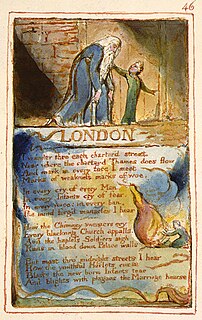
London is a poem by William Blake, published in Songs of Experience in 1794. It is one of the few poems in Songs of Experience that does not have a corresponding poem in Songs of Innocence. Blake lived in the capital city of London, which was the location for this poem. The poems reference the "Two Contrary States of the Human Soul". The "Songs of Innocence" section contains poems which reference love, childhood and nature. Critics have suggested that the poems illustrate the effects of modernity on people and nature, through the discussion of dangerous industrial conditions, child labour, prostitution and poverty.

"The Blossom" is a poem by William Blake, published in Songs of Innocence in 1789.

Holy Thursday is a poem by William Blake, from his 1789 book of poems Songs of Innocence.

"A Poison Tree" is a poem written by William Blake, published in 1794 as part of his Songs of Experience collection. It describes the narrator's repressed feelings of anger towards an individual, emotions which eventually lead to murder. The poem explores themes of indignation, revenge, and more generally the fallen state of mankind.
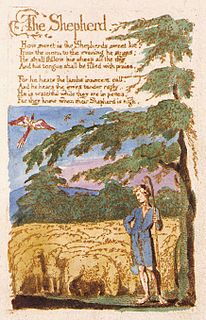
The Shepherd is a poem from William Blake's Songs of Innocence (1789). This collection of songs was published individually four times before it was combined with the Songs of Experience for 12 editions which created the joint collection Songs of Innocence and of Experience (1794). Blake produced all of the illuminated printings himself beginning in 1789. Each publication of the songs has the plates in a different order, and sixteen other plates were published posthumously

"The Divine Image" is a poem by the English poet William Blake from his book Songs of Innocence (1789), not to be confused with "A Divine Image" from Songs of Experience (1794). It was later included in his joint collection Songs of Innocence and of Experience (1794). In this poem Blake pictures his view of an ideal world in which the four traditionally Christian virtues–Mercy, Pity, Peace and Love–are found in the human's heart and stand for God's support and comfort. Joy and gratitude are sentiments expressed through prayer for the caring and blessing of an infallible almighty God and are shared by all men on Earth encompassing a sense of equality and mutual respect. The title of the poem refers to the Book of Genesis Chapter 1 verse 26: 'And God said: Let us make man in our image'.(KJV)
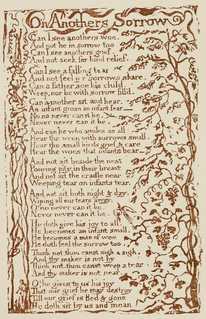
On Another's Sorrow is a poem by the English poet William Blake. The poem discusses human and divine empathy and compassion. It was published as part of the Songs of Innocence and of Experience in 1789 as the last song in the Songs of Innocence section.

Songs of Experience is the second studio album by American composer and producer David Axelrod. It was released in October 1969 by Capitol Records.
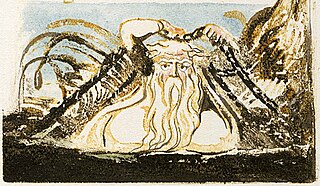
"The Human Abstract" is a poem written by the English poet William Blake. It was published as part of his collection Songs of Experience in 1794. The poem was originally drafted in Blake's notebook and was later revised for as part of publication in Songs of Experience. Critics of the poem have noted it as demonstrative of Blake's metaphysical poetry and its emphasis on the tension between the human and the divine.

The Voice of the Ancient Bard is a poem written by the English poet William Blake. It was published as part of his collection Songs of Innocence in 1789, but later moved to Songs of Experience, the second part of the larger collection Songs of Innocence and of Experience, 1794.
"Night" is a poem in the illuminated 1789 collection Songs of Innocence by William Blake, later incorporated into the larger compilation Songs of Innocence and of Experience. "Night" speaks about the coming of evil when darkness arrives, as angels protect and keep the sheep from the impending dangers.

"The Little Boy Found" is a poem by William Blake first published in the collection Songs of Innocence in 1789. Songs of Innocence was printed using illuminated printing, a style Blake created. By integrating the images with the poems the reader was better able to understand the meaning behind each of Blake's poems.

"The Little Boy Lost" is a simple lyric poem written by William Blake. This poem is part of a larger work entitled Songs of Innocence which was published in the year 1789. "The Little Boy Lost" is a prelude to "The Little Boy Found".
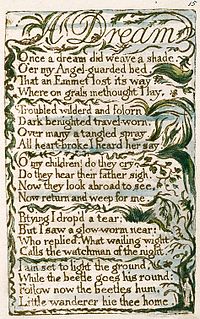
"A Dream" is a poem by English poet William Blake. The poem was first published in 1789 as part of Blake's collection of poems entitled Songs of Innocence.
